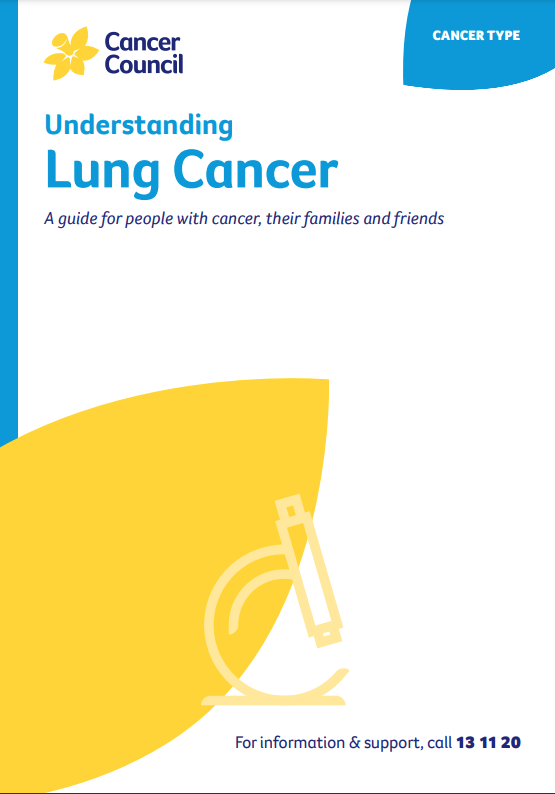- Home
- Lung cancer
- Diagnosis
- Your health care team
Your health care team
Your general practitioner (GP) will arrange the first tests to assess your symptoms. If these tests do not rule out cancer, you will usually be referred to a specialist called a respiratory physician. The specialist will arrange further tests.
If lung cancer is diagnosed, the specialist will consider treatment options. Often these will be discussed with other health professionals at what is known as a multidisciplinary team (MDT) meeting.
During and after treatment, you will see a range of health professionals who specialise in different aspects of your care.
To find cancer specialists, multidisciplinary teams and hospitals in NSW or ACT, you can visit the NSW Government website CanRefer.
Health professionals you may see
| GP | assists you with treatment decisions and works in partnership with your specialists in providing ongoing care |
| respiratory physician | diagnoses diseases of the lungs, including cancer, and recommends initial treatment options |
| thoracic surgeon | diagnoses and performs surgery for cancer and other diseases of the lungs and chest (thorax) |
| radiation oncologist | treats cancer by prescribing and overseeing a course of radiation therapy |
| radiation therapist | plans and delivers radiation therapy |
| radiologist, nuclear medicine specialist | analyse x-rays and scans; an interventional radiologist may also perform a biopsy under ultrasound or CT, and deliver some treatments; a nuclear medicine specialist coordinates the delivery of nuclear scans such as PET–CT |
| medical oncologist | treats cancer with drug therapies such as chemotherapy, targeted therapy and immunotherapy (also known as systemic treatments) |
| cancer care coordinator or lung cancer nurse coordinator | coordinates your care, liaises with other members of the MDT, refers you to allied health professionals, provides education and information, and supports you and your family throughout treatment; care may also be coordinated by a clinical nurse consultant (CNC) or clinical nurse specialist (CNS) |
| nurse | administers drugs and provides care, information and support throughout treatment |
| psychologist, counsellor | help you understand and manage your emotional response to diagnosis and treatment |
| dietitian | helps with nutrition concerns and recommends changes to diet during treatment and recovery |
| speech pathologist | helps with communication, speech and swallowing problems from the cancer, or after treatment |
| social worker | links you to support services and helps with emotional, practical and financial problems |
| occupational therapist | assists in adapting your living and working environment to help you resume your usual activities |
| physiotherapist, exercise physiologist | help to maintain and restore movement and mobility before and after treatment, and improve fitness and wellbeing |
| palliative care specialist and nurses | work closely with the GP and cancer team to help control symptoms and maintain your quality of life and keep you comfortable and well looked after at end of life |
→ READ MORE: Lung cancer treatment
Podcast for people affected by cancer
Listen now
More resources
Dr Malinda Itchins, Thoracic Medical Oncologist, Royal North Shore Hospital and Chris O’Brien Lifehouse, NSW; Dr Cynleen Kai, Radiation Oncologist, GenesisCare, VIC; Dr Naveed Alam, Thoracic Surgeon, St Vincent’s Hospital, Epworth Richmond, and Monash Medical Centre, VIC; Helen Benny, Consumer; Dr Rachael Dodd, Senior Research Fellow, The Daffodil Centre, NSW; Kim Greco, Specialist Lung Cancer Nurse Consultant, Flinders Medical Centre, SA; Caitriona Nienaber, 13 11 20 Consultant, Cancer Council WA; Marco Salvador, Consumer; Janene Shelton, Lung Foundation Australia – Specialist Lung Cancer Nurse, Darling Downs Health, QLD; Prof Emily Stone, Respiratory Physician, Department of Thoracic Medicine and Lung Transplantation, St Vincent’s Hospital Sydney, NSW; A/Prof Marianne Weber, Stream Lead, Lung Cancer Policy and Evaluation, The Daffodil Centre, NSW.
View the Cancer Council NSW editorial policy.
View all publications or call 13 11 20 for free printed copies.

